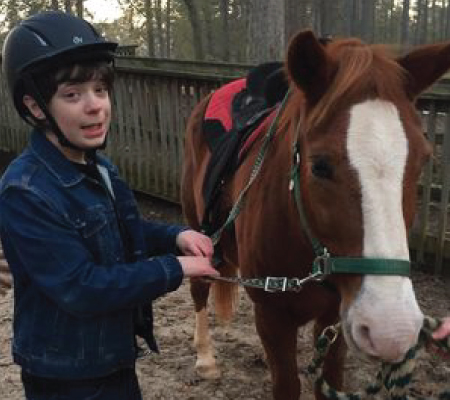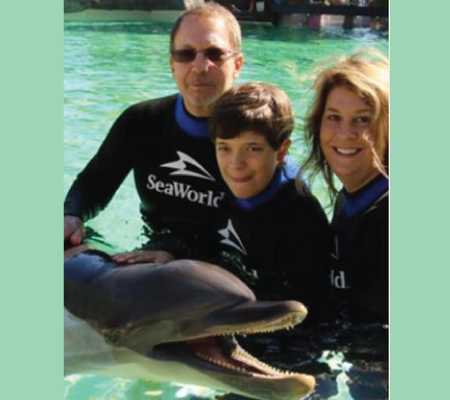“At the time of David’s diagnosis, we were devastated and heartbroken. We felt like our hopes and dreams for David’s future were destroyed,” said Maxie McGlohon. “We didn’t know who to turn to. We had never heard of Bardet-Biedl syndrome and most of our doctors hadn’t either. Prior to the diagnosis, our local doctors thought he was just delayed and would eventually catch up.”
The McGlohon family, Maxie, David Sr. and their son David, live in North Carolina, and now routinely visit Marshfield Medical Center in Marshfield. Although the BBS diagnosis when David was five changed their lives, they say they found a way to make these changes for the better.
What is Bardet-Biedl Syndrome (BBS)?
BBS is a rare genetic disorder, present from birth, which affects many parts of the body. Because it’s so rare, BBS may not be recognized early. It may cause impaired vision, obesity, chronic kidney disease, extra fingers and toes and problems with language and communication.
All prenatal checks were normal when Maxie was pregnant and David met all his milestones up until 15 months. When his speech was delayed and he was struggling to walk, his parents realized something was wrong.
“He had an extra toe when he was born, but our doctors weren’t concerned and told us this could be a normal variant. They didn’t think we needed additional follow-up,” said David Sr. “They also saw the enlarged kidneys in-utero, but there was no concern.”
Maxie and David Sr. met with their local pediatrician, a neurologist and geneticist in North Carolina. It was through their geneticist they received the BBS diagnosis.
“Our geneticist said he will be blind by the time he is a teenager, he’ll need a kidney transplant and he’ll never have children. We asked what we can do. She said there’s nothing, because there’s no cure and coldly sent us on our way. We said, ‘That’s not good enough.’”
The McGlohon family didn’t immediately seek out care
They attended a BBS conference at Duke University in North Carolina shortly after David’s diagnosis, but needed time to process the information to truly learn about the condition.
“We came home and had a time of mourning, grieving the loss of the future we had hoped for him,” Maxie said. “We had a beautiful little boy and dreamed he’d play football like his dad did and maybe be a dentist or a doctor and go to college. We had all these dreams of what a regular childhood would be like.”
Over the next few years, they concentrated on speech therapy, physical therapy and occupational therapy trying to help with David’s communication and autistic behaviors.
“We weren’t aware of any specialty clinics for BBS, until we researched and found the BBS Center of Excellence,” Maxie said.

BBS is a rare genetic disorder, present from birth, which affects many parts of the body. Because it’s so rare, BBS may not be recognized early.
They visit the BBS multispecialty clinics, hosted at Marshfield Medical Center in Marshfield
A multispecialty clinic for children and adults with Bardet-Biedl Syndrome is offered through Marshfield Clinic Health System at the Marshfield campus. This is the only clinic in the United States providing comprehensive, clinical evaluations and individualized treatment care recommendations for BBS.
Patients visiting the clinic may have appointments with cardiology, endocrinology, medical genetics, neurology, neuropsychology, nutrition, physical medicine and rehabilitation, speech therapy and more.
“When we learned about Marshfield, we knew it was a long way from North Carolina,” said David Sr. “This was like nothing we had ever seen and we knew we wanted to help David be the absolute best he could be.”
David was eight years old when they first visited the multispecialty clinic and now come every two years.
“It changed our lives. We had never met another child with BBS or another family,” Maxie said.
David had appointments from neurology to physical medicine
After meeting with the providers, Maxie and David Sr. are provided care and treatment plans and other recommendations for David to use at home and at school. They especially thank Tammi Timmler, registered dietitian, and Dr. Ekaterina Keifer, neuropsychologist.
Timmler sees Bardet-Biedl syndrome patients for nutrition-related concerns, like hyperphagia, the uncontrollable desire to want to eat that can lead to obesity, diabetes, hyperlipidemia and general nutrition.
“There’s such a stigma in society, in respect to being overweight or obese. Often parents come to us ashamed or angry about past experiences. I think all of our providers do a great job in listening to the patients and families to find a treatment plan that is designed for them. Every patient is different and the key is to really listen to what they are telling you,” Timmler said. “This family is amazing…they are heavily-engaged in doing anything and everything possible to help David improve his health and succeed in life.”
Dr. Keifer sees patients for neurodevelopmental, cognitive and social differences that may affect the patient’s life.
“I think one of the most important aspects of working with David was discovering his strengths and unique characteristics as a person. He has many wonderful qualities not easily measured or observed with standard procedures,” said Dr. Keifer. “As a result, we were able to provide some diagnostic clarification, specific recommendations for behavior modifications and strategies for school to maximize his strengths.”
Through the clinics, they also learned that roughly 25% of people living with BBS also have autism, which is another part of David’s life. Not only does David receive care for BBS, his providers through the clinics can also help him with therapies for autism.
Part of his care is helping keep his weight under control – which they do through activities like adaptive skiing, horseback riding, surfing, biking, swimming and more.
“Although David has challenges ahead, with the proper therapies and support in place, he can still live a full and wonderful life,” Maxie said. “With new research and therapies, we are hopeful for the future of BBS.”
David’s bucket list
They learned Bardet-Biedl syndrome is a spectrum that affects everyone differently. While David’s retinas and kidneys have not been affected, they understand things can rapidly change.

“We try to think of things we would want to see if we were going to lose our vision,” Maxie said. “It’s not the life we had originally planned, but in many ways, it’s even better. David has made us stronger humans with a new perspective on what’s truly important in life.”
“When you don’t know how long your child is going to have their vision, you want them to see and experience everything and make all the memories they can while their retinas are still working. We’re fortunate and blessed that his retinas are stable at this time,” said David Sr.
The family brings David with them almost everywhere. They have taken trips to New York to see the Radio City Rockettes, Disney World, Salt Lake City, California and most recently, saw many states while driving from North Carolina to Wisconsin. They call it David’s bucket list.
“We try to think of things we would want to see if we were going to lose our vision,” Maxie said. “It’s not the life we had originally planned, but in many ways, it’s even better. David has made us stronger humans with a new perspective on what’s truly important in life.”
Follow along through David’s journey, including Maxie’s blog on Facebook and Instagram, called Hanging 11 with David: Surfing Through Life with Bardet-Biedl & Autism, which offers support for families affected by BBS.
Join the BBS Parents Support Group: The group meets the fourth Monday of each month at 7:00 p.m. Central Time, using the Marshfield Clinic Zoom site. Maxie moderates the group, which helps to offer support, especially to newly-diagnosed families. For more information, contact Maxie.


What amazing parents!
I can't help but think that David was meant to be born to these amazing parents, who apparently have gone to great lengths to give their son the best life ever. Kudos to them for not only accepting their son as he is, but also doing whatever is possible to enhance his life and in the meantime enjoying adventures they didn't think they may have. God bless this family!